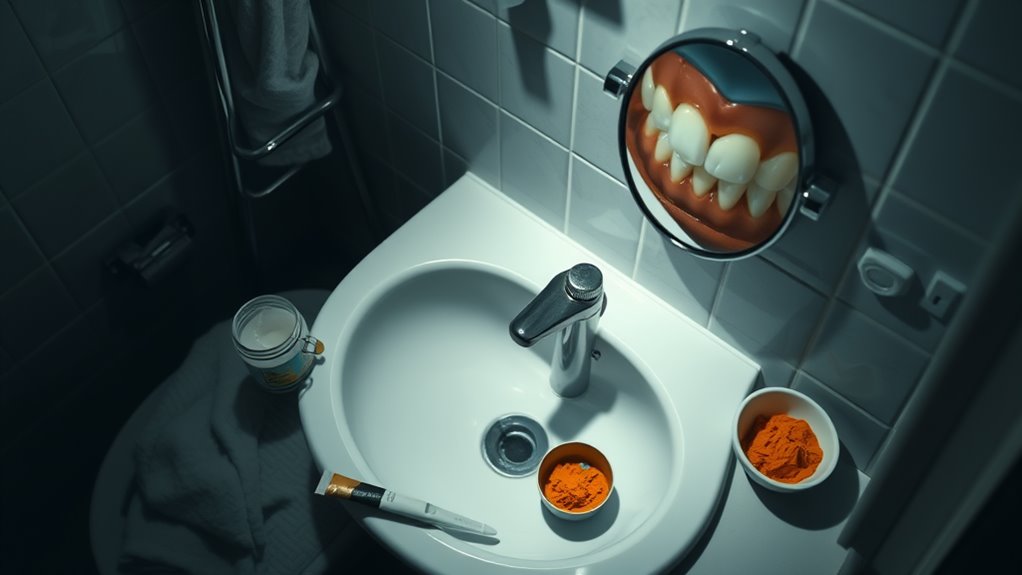Tooth Pain at Night. Here’s What It Could Mean for Your Health!
If you’re experiencing tooth pain that worsens at night, it’s not just in your head. When you lie down, increased blood flow to your head intensifies dental discomfort, while reduced saliva production during sleep leaves teeth more sensitive. Common culprits include cavities, gum disease, teeth grinding, and sinus infections. While temporary relief methods exist, persistent nighttime tooth pain could signal serious underlying issues that demand professional attention.
Understanding Why Tooth Pain Worsens at Night
When you lie down at night, increased blood flow to your head amplifies tooth pain and makes dental problems more noticeable. This horizontal position allows more blood to reach your head and mouth, creating additional pressure on sensitive areas.
During the day, you’re often distracted by various activities, but at night, your brain has fewer sensory inputs to process, making you more aware of discomfort.
Nighttime tooth pain can also worsen if you grind your teeth while sleeping, a condition called bruxism. The lack of saliva production during sleep reduces your mouth’s natural ability to neutralize acids and bacteria, potentially intensifying tooth sensitivity.
Additionally, if you’ve been clenching your jaw due to stress throughout the day, the accumulated tension can lead to more severe pain at night.
Common Causes Behind Nocturnal Dental Discomfort
Several common dental issues can trigger nighttime tooth pain, including cavities, infected gums, cracked teeth, and exposed roots. When you’re lying down, blood flow to your head increases, which can intensify dental pain and make existing problems more noticeable.
-
Tooth decay and cavities create sensitivity to temperature changes, causing sharp pain that’s often worse when you’re trying to sleep.
-
Gum disease and infections lead to inflammation that can throb persistently throughout the night.
-
Grinding or clenching your teeth during sleep puts extra pressure on damaged teeth and jaw muscles.
-
Sinus infections and allergies can create pressure in your upper teeth, making them feel particularly tender at night.
These underlying conditions often require professional attention to prevent the pain from becoming chronic or severe.
The Link Between Sleeping Position and Tooth Pain
Your sleeping position plays a crucial role in nighttime tooth pain, especially if you’re dealing with existing dental issues. When you lie flat, blood flow increases to your head, which can intensify tooth pain and inflammation. Side sleeping might worsen discomfort if you’re pressing against an affected tooth.
| Position | Impact on Teeth | Recommendation |
|---|---|---|
| Back | Blood pools in head | Elevate head 30° |
| Right Side | Pressure on right teeth | Avoid if right side hurts |
| Left Side | Pressure on left teeth | Avoid if left side hurts |
Try elevating your head with extra pillows to reduce blood pressure in the affected area. If you notice your pain consistently worsens in certain positions, adjust your sleeping posture and consult your dentist for personalized advice.
Quick Relief Methods for Nighttime Tooth Pain
Finding immediate relief from nighttime tooth pain can make the difference between restless tossing and peaceful sleep.
When tooth pain strikes at night, you’ll want to try these proven methods for quick relief while you wait to see your dentist.
-
Rinse your mouth with warm salt water to reduce inflammation and kill harmful bacteria that may be causing the pain.
-
Apply a cold compress to your cheek for 15 minutes to numb the affected area and reduce swelling.
-
Take an over-the-counter pain reliever like ibuprofen to help manage both pain and inflammation.
-
Elevate your head with an extra pillow to prevent blood from pooling in your mouth, which can intensify tooth pain.
These temporary solutions can help you get through the night until you can seek professional dental care.
Warning Signs That Require Immediate Dental Attention
While home remedies can provide temporary relief, certain tooth pain symptoms signal a serious dental emergency that shouldn’t wait until morning.
If you’re experiencing severe, throbbing pain that keeps you from sleeping, or if you notice swelling in your face, jaw, or neck, seek immediate medical attention. These symptoms could indicate an abscess or severe infection.
You should also get emergency care if you’ve suffered trauma to your mouth, have a loose or knocked-out tooth, or notice bleeding that won’t stop.
Watch for signs of fever, difficulty breathing or swallowing, or persistent pain that doesn’t respond to over-the-counter medication. A foul taste in your mouth combined with pain might signal an infection that could spread to other parts of your body if left untreated.
Prevention Strategies for Nighttime Tooth Pain
To prevent nighttime tooth pain from disrupting your sleep, maintaining consistent dental hygiene practices is essential. You’ll want to establish a solid routine that protects your teeth around the clock, especially before bedtime.
-
Brush thoroughly for two minutes using fluoride toothpaste, and don’t forget to floss between all teeth to remove trapped food particles and plaque.
-
Avoid consuming acidic or sugary foods and beverages within two hours of bedtime.
-
Wear a night guard if you grind your teeth during sleep, as this can help reduce pressure and wear on your teeth.
-
Schedule regular dental checkups every six months to catch potential issues before they develop into painful nighttime problems.
Keep your bedroom temperature cool and elevate your head slightly while sleeping to reduce blood flow to aching teeth.




